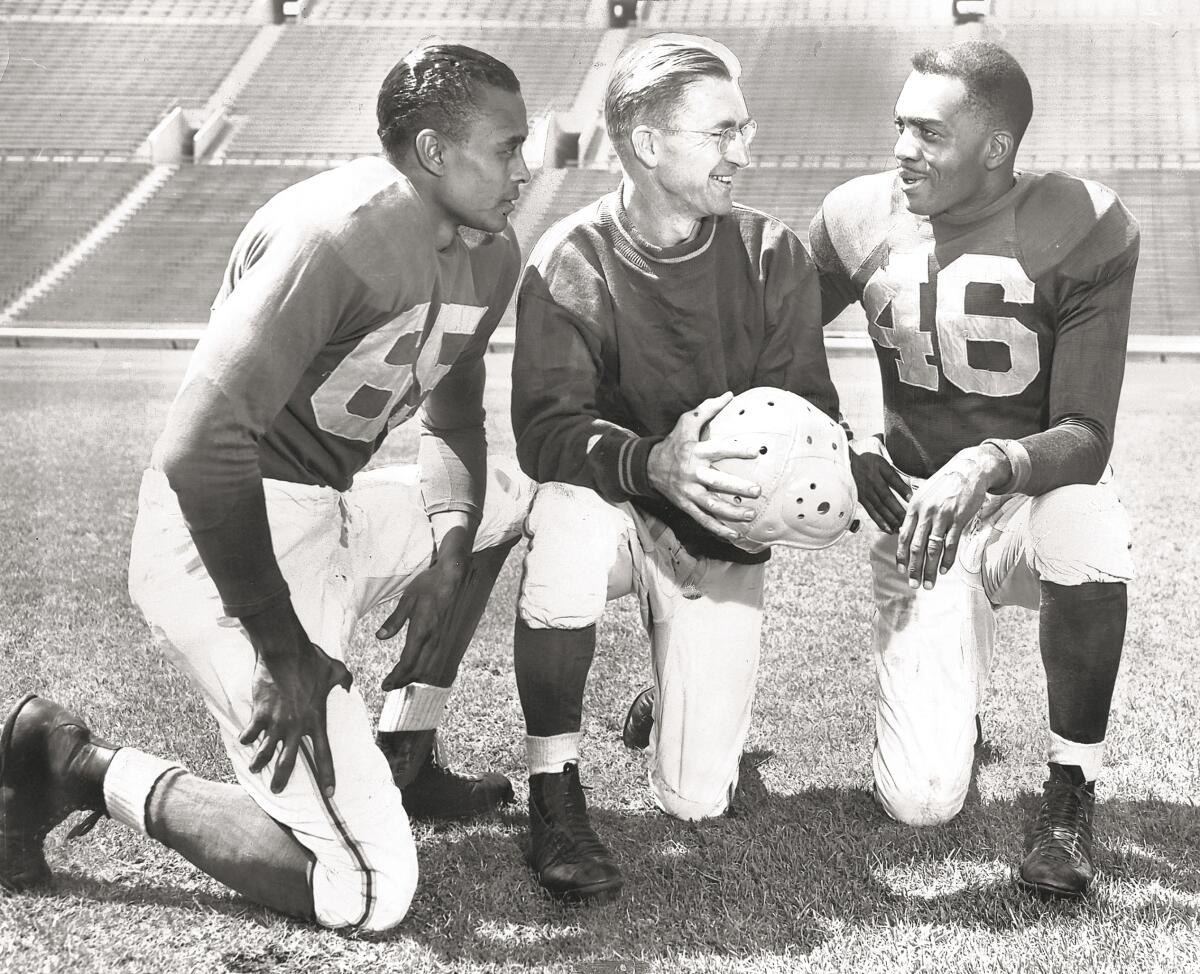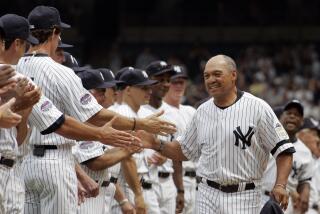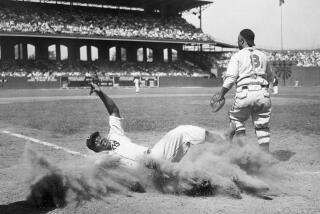Column: The NFL should stop running from its racial history

Expect plenty of Super Bowl talk when the Los Angeles Rams face off against the Tampa Bay Buccaneers in L.A. on Sunday. First, Bucs quarterback Tom Brady is basically synonymous with the Super Bowl, and his team is the defending champion. Second, it’s a preview of sorts, because L.A. will be hosting the Super Bowl this season, for the first time since 1993.
February’s big game is not just a perfect chance to showcase the $5-billion crown jewel SoFi Stadium, which opened a year ago. It’s also the logical time and place for the league to correct a historical injustice.
For the record:
6:20 p.m. Sept. 22, 2021An earlier version of this article incorrectly stated that Kenny Washington was the first Black player to sign an NFL contract. He was the first in the modern era.
Riddle me this: How is it possible that in the city of Jackie Robinson and the Dodgers, the name Kenny Washington generally inspires blank stares?
Who is Kenny Washington?
Well, in March 1946 he became the first Black player in the modern era to sign an NFL contract. The team? The Los Angeles Rams.
It’s an undertold story, especially considering that both Washington and Woody Strode, who signed with the Rams two months after Washington, were Robinson’s teammates in the football program at UCLA. Although the Bruins retired Washington’s number and he’s in the College Football Hall of Fame, he is nowhere near as celebrated by the NFL as Robinson is by MLB and by American culture at large.
And Washington even broke the color barrier a year before Robinson did.
In fact, it’s partly because of the success of Washington and Strode that Brooklyn Dodgers President Branch Rickey decided to integrate baseball and sign Robinson. Two other data points helped: In 1946, Marion Motley and Bill Willis had integrated the Cleveland Browns, then part of the All-America Football Conference.
What a tremendous piece of history, one worthy of celebration by the country’s most popular sports league. What better way for the NFL to put some more umph behind the words “end racism” — which have been stenciled in end zones — than to lift up the stories of these four Black men at the Super Bowl, during Black History Month, in the very city where the NFL’s journey to “end racism” began?
“You used to be able to tell the story of the NFL without telling this story, but not anymore,” said Keyshawn Johnson, a former NFL player. He co-wrote a new book about Washington and the others, “The Forgotten First,” with Newsday football columnist Bob Glauber.
“There needs to be some sort of date in honor of these four men, the way baseball made the decision to have Jackie Robinson Day,” Johnson said. “The commissioner and his crew certainly should do something.”
Kevin Demoff, chief operating officer of the Rams, said that when the team moved back to Los Angeles, it began working with Washington’s family to help promote his story. The Rams plan an event toward the end of this season to mark the 75th anniversary of Washington signing with the Rams. “I think Kenny’s story should be well told in the NFL and known by the players, teams and everyone who loves the game,” he said. “All four players should have their stories celebrated.”
So why isn’t the story about the integration of professional football already well known?
“Football was not as popular as baseball back when Kenny and Woody joined the Rams,” Glauber said. “There just wasn’t the attention on it. But the racism they faced was real.”
“The Forgotten First” is a beautifully written account. The interviews with family members, along with details of the politicking behind the scenes, elevate the manuscript from simply being a sports book to one that touches on America’s complicated racial history as well as how it plays out today.
The light it sheds is unflattering.
“Integrating the NFL was the low point in my life,” Strode reportedly told Sports Illustrated. “There was nothing nice about it. History doesn’t know who we are. Kenny was one of the greatest backs in the history of the game, and kids today have no idea who he is.
“If I have to integrate heaven … I don’t want to go.”
Passages like that are painful to read, especially knowing what we know about the seven decades that followed. It was only last year that the franchise in Washington, D.C., decided to stop using a racist slur as its team name.
It’s only by acknowledging the obstacles that one can fully appreciate the breakthrough. The NFL can provide that spotlight. If the league took a mulligan on the telling of integration, millions would listen.
Glauber credits Paul Brown, the Cleveland Browns co-founder, with integrating that league: “He did it with a purpose. Not a civil rights purpose, but he wanted the best team possible and wanted to sign the best players possible. That was it.”
Odd, given how brash the NFL is when it comes to promoting itself, that it hesitates to stake its claim at this important moment in history. Perhaps it’s because the league would have to talk about owners like George Preston Marshall, who “The Forgotten First” quotes as having said, “We’ll start signing Negroes when the Harlem Globetrotters start signing whites.” Maybe the league doesn’t want to remind fans that other owners either agreed with Marshall or, as the book points out, were complicit.
Marshall, owner of the Washington team, “basically said you can’t play in Washington with Black players,” according to Jim Rooney, the grandson of Steelers founder and owner Art Rooney. “My grandfather, new in the league, sort of followed the rule there, which he has admitted was the biggest mistake in his life.”
Jim Rooney’s father, Dan, led the NFL diversity committee that devised the “Rooney rule,” a league policy requiring teams to interview minority candidates whenever filling a leadership position.
The NFL’s racial history is awkward to talk about, swirling together shame and pride. But it’s also important.
The league wants to do its part to “end racism”? Commemorate the forgotten firsts. And what better place to start than at the Super Bowl held in the city where NFL integration began?
More to Read
A cure for the common opinion
Get thought-provoking perspectives with our weekly newsletter.
You may occasionally receive promotional content from the Los Angeles Times.











